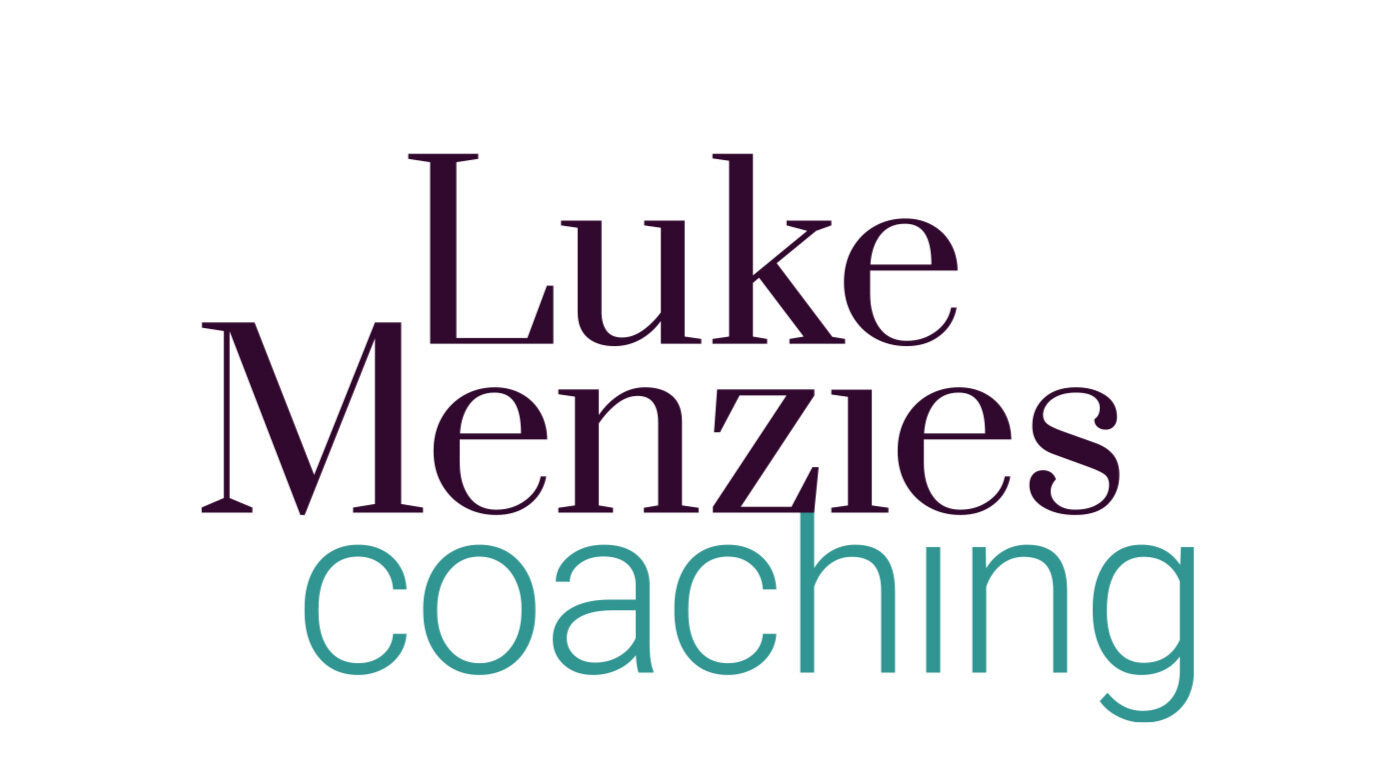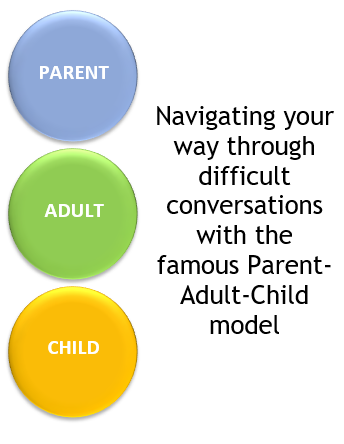Dealing with difficult clients (and opponents): the Parent-Adult-Child model
Building on what I’ve discussed in my previous dealing with difficult clients blogs, I’d now like to introduce you to Eric Berne’s Parent-Adult-Child model.
Like the Drama Triangle, the Parent-Adult-Child model is a fascinating and incredibly helpful way for us to think about interactions we have with other people which dissolve into conflict or unpleasantness, and understand more about what was going on in that conversation ‘beneath the surface’. This then allows us to spot the same pattern happening again in future conversations, and helps us learn to reduce or avoid the same sorts of repeating patterns of argument and conflict in future.
For those of us in challenging client/customer-facing roles, our gaining this depth of understanding can significantly increase our resilience in our work. Plus, we can take the knowledge home with us too!
Berne’s theory is that we each have three main ways of thinking and responding to the world around us and other people in particular. He called these our ego states. He saw us as each having three natural ego stages: Parent, Adult and Child.
Here is a very brief introduction to each of these states.
Parent
Our Parent ego state is the frame of mind we’re in when we say or do something parental. It may be a nurturing parental comment or a controlling parental comment. Most conversations involving conflict involve the controlling Parent ego state: for example, I tell you off for doing something I don’t like. But if we find ourselves giving in to poor behaviour, we might be in the nurturing Parent ego state: for example, mollycoddling the badly behaving person or letting them get away with their unreasonable behaviour.
Child
Our Child ego state is the frame of mind we’re in when we say or do something childlike. It may be a ‘good child’ thing or a ‘naughty child’ thing. When in dispute with someone else, it tends to be our naughty Child ego state that’s in play. Here, we tend to behave spontaneously according to our needs and feelings - childishly. For example, being angry, attacking, disobedient, rude, provocative or sulky.
Adult
Things always go better for us in a conversation that is one of conflict (or liable to move into conflict) if we can avoid stepping into our Parent or Child ego state band instead be in our Adult state. In ‘Adult’, we can say and do healthy, calm, grown-up things. We can do so because we’re not hijacked by either overly parental thoughts and feelings, or childlike responses. It is where the phrase “adult-to-adult conversation” comes from.
When we speak from our Child ego state, the other person in the conversation has three options. They may respond from their ‘Parent’, often admonishing us for what we’ve just said. Or they may respond from their ‘Child’, which might be responding to our rudeness/anger/attack/sarcasm with their own rudeness/anger/attack/sarcasm. But, if we’re lucky, they may be able to respond from their ‘Adult’, in which they manage to provide us with a measured, mature response that will de-escalate the conflict that may be creeping into the conversation. (Think of the Adult state as how a judge might approach a legal decision or ensure a trial runs smoothly and fairly.)
The antidote for us is to have an eye open to what’s happening in terms of this model, beneath the surface of an interaction, and doing our best to only respond from our ‘Adult’ self, rather than our ‘Parent’ or ‘Child’.
Here are some examples based on being the legal profession.
Client in Child ego state
A lawyer’s client might moan and groan about their situation in an “it’s not fair!” sort of way. That will be them in their Child ego state. In response, their lawyer might find themselves responding from nurturing ‘Parent’, along the lines of “oh poor you, I will sort it all out, I will rescue you, never fear”.
But solving the situation might in fact might be outside of the lawyer’s power, leading to more unhappiness and perhaps eventually a complaint.
Often, a better response from the lawyer might be found if they can respond from their ‘Adult’, along the lines of “I recognise this is a really difficult situation for you. I promise you I’m doing all I can, but I may not be able to give you everything you want”.
Opponent in Parent ego state
In a court case, a lawyer’s opponent might say in a phone call or letter something like “You’ve got this all wrong, you don’t understand the law, you don’t know what you’re doing, you’re being ridiculous”, etc. This is sadly very common, despite it not being very professional. The opponent is speaking/writing from their controlling ‘Parent’ mode.
How might the other lawyer respond to this? Being only human, we might well initially respond (even if only inside our head) from our ‘Child’, feeling hurt and perhaps angry at such treatment. Every lawyer has been there, especially early in our career before we’ve grown a thicker skin to this sort of bullying behaviour. We might then say or write something rude, aggressive or sarcastic back, responding from our ‘Child’ in turn (this is very common and can lead to very expensive legal cases where only the lawyers ‘win’ in the end). Or we might respond from our controlling ‘Parent’ state, ticking off our opponent for their words and seeking to correct (or lecture) them (again, often leading to more calls or letters while we argue it out).
But the most healthy and ultimately best way to respond to such behaviour is to respond from our ‘Adult’, and do our best not to engage in the little row that our opponent appears to want to have with us. (Pick your battles!) Instead, we can either say or do very little in response (often a superb way to respond) or just calmly and simply state our own client’s needs or position and leave it there.
My own experience today
I did my best to channel my ‘Adult’ today, when I wrote a reply to an opposing solicitor’s provocative email (them wanting to go over old arguments again) with the words “We have already set out our client’s position on this, and we have nothing further to add.” I will admit that my ‘Child’ initially came up with a “F*** you!” response inside my head. I’m only human. And then I noticed a ‘Parent’ voice suggesting that I should reply along the lines of “How many times have we made it clear that….?” But eventually my ‘Adult’ state won the day.
And it was this realisation that made me want to write this blog today.
Summary
So whenever you are dealing with any situation involving argument, dispute or conflict (verbal or written), try to allow yourself the opportunity to take a breath, step back for a moment and look at what’s going on ‘beneath the surface’ of this interaction, through the lens of Parent-Adult-Child.
Could anyone be said to be scolding or laying down the law (Parent) to the other? Is anyone moaning, goading, attacking or being rude (Child) to the other? Or is a genuine Adult-to-Adult interaction taking place?
If the other person sounds as if they’re being a bit parental or childlike, try to avoid taking the bait and slipping into your own Parent or Child mode. Instead, stick to simple, calm statements of your needs and your position. Stick to being the Adult in the conversation.
The good news is that playing the Adult tends to be contagious. You tend to get more Adult responses in return. And that’s what we all want, really.
If you found this blog useful, be sure to read my other blogs on dealing with clients: Dealing with difficult clients: the secret to being resilient, Dealing with difficult clients: the Drama Triangle and Dealing with difficult clients: the Drama Triangle (part 2).
Like to talk?
If you’d like to talk about your own situation, I’d love to hear from you. Find me at www.lukemenziescoaching.com. Come and have a free, no-commitment Chemistry Session with me, where we can start to unpack some of this for you and you can get a feel for whether coaching might help you.






